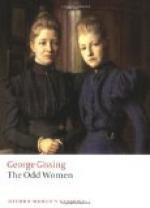Rhoda came in, so quietly that she was able to observe the guest before he had detected her presence. The movement of Miss Barfoot’s eyes first informed him that another person was in the room. In the quietest possible way the introduction was performed, and all seated themselves.
Dressed, like the hostess, in black, and without ornaments of any kind save a silver buckle at her waist, Rhoda seemed to have endeavoured to liken herself to the suggestion of her name by the excessive plainness with which she had arranged her hair; its tight smoothness was nothing like so becoming as the mode she usually adopted, and it made her look older. Whether by accident or design, she took an upright chair, and sat upon it in a stiff attitude. Finding it difficult to suspect Rhoda of shyness, Miss Barfoot once or twice glanced at her with curiosity. For settled conversation there was no time; a servant announced dinner almost immediately.
‘There shall be no forms, cousin Everard,’ said the hostess. ’Please to follow us.’
Doing so, Everard examined Miss Nunn’s figure, which in its way was strong and shapely as his own. A motion of his lips indicated amused approval, but at once he commanded himself, and entered the dining-room with exemplary gravity. Naturally, he sat opposite Rhoda, and his eyes often skimmed her face; when she spoke, which was very seldom, he gazed at her with close attention.
During the first part of the meal, Miss Barfoot questioned her relative concerning his Oriental experiences. Everard spoke of them in a light, agreeable way, avoiding the tone of instruction, and, in short, giving evidence of good taste. Rhoda listened with a look of civil interest, but asked no question, and smiled only when it was unavoidable. Presently the talk turned to things of home.
‘Have you heard of your friend Mr. Poppleton?’ the hostess asked.
‘Poppleton? Nothing whatever. I should like to see him.’
‘I’m sorry to tell you he is in a lunatic asylum.’
As Barfoot kept the silence of astonishment, his cousin went on to tell him that the unhappy man seemed to have lost his wits among business troubles.
‘Yet I should have suggested another explanation,’ remarked the young man, in his most discreet tone, ’You never met Mrs. Poppleton?’
Seeing that Miss Nunn had looked up with interest, he addressed himself to her.
’My friend Poppleton was one of the most delightful men—perhaps the best and kindest I ever knew, and so overflowing with natural wit and humour that there was no resisting his cheerful influence. To the amazement of every one who knew him, he married perhaps the dullest woman he could have found. Mrs. Poppleton not only never made a joke, but couldn’t understand what joking meant. Only the flattest literalism was intelligible to her; she could follow nothing but the very macadam of conversation—had no palate for anything but the suet-pudding of talk.’




